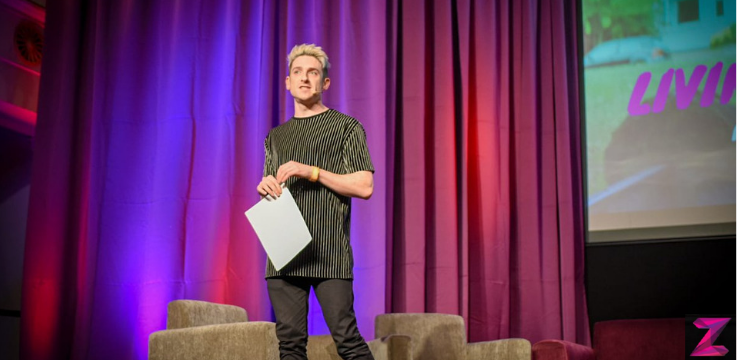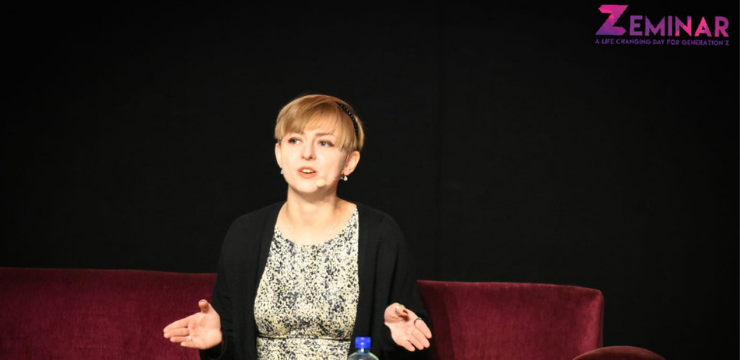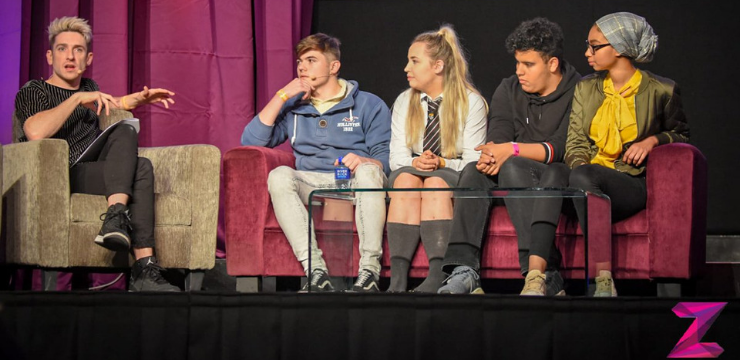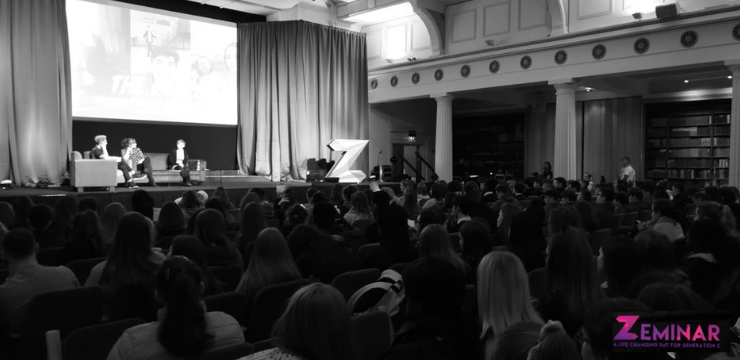Living Our Best Lives: Managing Your Online Well-Being, Zeminar 2018
Last week, Webwise once again took to the main stage at Zeminar Youth Conference, an event that focuses on the mental and physical wellbeing of 15-20-year-olds. The one-hour talk, Living Our Best Lives: Managing Your Online Well-Being, was hosted by Stephen Byrne (RTÉ).

Stephen Byrne took a few moments to talk to the audience on his own experience of social media. Stephen began vlogging on YouTube from an early age and was one of the few who used the internet in that way among his peers and classmates. Stephen has recently redone his Leaving Certificate and spoke about the vast disparity between his generation’s attitude to the online environment in comparison with today’s teens. The need to “manage your online presence” is an ever-pressing concern for young people today and gives rise for the need to manage online well-being more than ever before.
Beckie Brown Talks Online Well-being

The talk was officially opened by a keynote speech from Beckie J. Brown. Rebecca, or Beckie as she is more commonly known, is a mental health advocate and one of the world’s longest running vloggers. In 2004, as an 11-year-old schoolgirl, Beckie was among the first generation to be introduced to social media. She started sharing videos of her life online for anyone to watch. Thousands followed her life growing up, seeing her struggle with Trichotillomania, anxiety, and depression. Growing up online, Beckie has been able to meet people from around the world. She spoke about reaching others with Trichotillomania and being a source of support for other sufferers. “If you are somebody out there, who wants to say something, say it, go for it, whatever you have got inside of you share, you have no idea the potential of what you can have with what you are saying online.”
Beckie has amassed a serious following and most of her videos and posts reach over 30,000 people, an accomplishment that she has used wisely. She has been invited to speak at conferences around the world and is now longer just alone in her bedroom. She reached 80 million people on Australian television providing a voice for people who suffer similar disorders. “The biggest thing for me, sharing my disorder, is not only enabled me to feel less alone, but to connect with millions and millions of people worldwide.”
Positives v Negatives Online
Not all of her experiences have been positive however, Beckie spoke about being stalked, trolled and belittled by people online. She gave some pertinent advice on how to deal with some of the common concerns that young people now face while living their lives so publically. Beckie spoke about the pressure she has felt to continue sharing, and she advises that if you are someone who shares their life online, you are allowed to keep things private. Being young and documenting her life through videos, Beckie has learned that sometimes it is best to stop and think before sharing, especially when your emotions are running high. “With sharing online, with whatever you do, be responsible and think ahead. If you are someone who is struggling… sometimes delay with you want to share, those few hours can change your perspective.”
The Panel
Following the keynote, Beckie was joined by Steven Byrne and Jess Kelly to discuss how to manage online well-being and some of the pitfalls that people fall into when using social media. Jess Kelly shared her school experience of finding it difficult to fit into a ‘clique’ and identified online as a place where she found solace. There she learned to find her voice and her tribe. She later turned her love of technology into a career but despite its positives, technology also came with many negatives. Jess detailed her experience of cyberbullying at the age of twenty-two when she began her work as Tech Correspondent Newstalk and and on her Podcast Tech Talk. Being bullied in school was a lot different to being cyberbullied: “I’d go home, I’d get over it, I’d play with my brother in the garden and that would be the end of it.” As an adult Jess has had to deal with negative comments online which occurred at any time of day and made her feel like she had no escape. Jess stated that having a website like Webwise, that provides reliable talking points and practical advice was so important for young people today. “…it does come down to building resilience and just knowing what to do and where to turn if something goes wrong.”
Beckie has found that there is more support offered by the Police with regards to online bullies and cases of stalking or trolling are being taken more seriously nowadays. She also stated that you do need to build resilience if you are sharing your life online. “Bullying always existed… it’s a case of mentally blocking it out, you have to build a thick skin.”

Stephen went on to talk about FOMO and how he had to teach himself not to be jealous or take at face value who portray the ‘best lives’ online. Beckie came from a generation vloggers were raw all the time and were more open and honest about their struggles. Both Beckie and Stephen agree that this has changed in the last decade, people are now only showing their highlights.
Stephen deleted 20,000 tweets after moving more in the spotlight as he felt he had shared too many personal moments over the years. Beckie put it very well when she said: “Everyone wants to put their best self out there, but instead of feeling a connection that people are going through the same things as you- it starts to feel like – oh they are living a better life than you and it’s taken me … a long time to realise that … the people around me, not that they lie, but they don’t share everything.” Both Jess and Beckie believe that young people need to use social media as genuinely as possible- showing both the good and the bad/ trying not to compete but “…know who you are, and know who you are not.” (Jess Kelly). Be happy with who you are and how you live your life. It may also help to use social media to follow inspirational people or family and friends. Remember that you can choose not to follow people who impact negatively on your mental health and follow people who make you feel inspired rather than envious.
Webwise Youth Panel
Following the panel discussion with Jess and Beckie, the new Be In Ctrl video was showcased. To date, the video has been viewed over 1.2 million times since its launch in late September. The video shows the lives of two young people who become victims of online sexual coercion, and online exploitation and is part of the free post-primary resource Be in Ctrl, available at Webwise.ie/beinctrl. Members of the Webwise Youth Panel and ISSU (Irish Secondary Students’ Union) were invited on stage for a panel discussion. They were also joined by actor Nathan O’Toole, who plays the main male lead in the video. In addition to speaking about the impact of the video, Nathan stressed the need for young people to be aware of these crimes and to speak out if they become a victim.
The panel discussed the need to be aware of fake news, and “influencers” who are paid to look and say certain things in exchange for money. Webwise Youth Panelist Lauren wants young people to know that many influencers “… are paid to put on a facade…it’s not the reality, people only see the photoshopped and filtered pictures, they only see the positives.” The panelists also highlighted the Webwise Safer Internet Day Ambassador Programme and some of the positive actions they have taken since joining the Webwise Youth Programme.

Finally, the panel discussed what young people could do to promote online safety in their homes and schools. The panelists highlighted the Webwise Safer Internet Day Ambassador Programme as an excellent way of meeting like-minded people and bringing something positive into their schools for their peers. Webwise Youth Panelist and ISSU member Eiman told Stephen how rewarding her experiences have been to date and how the programme can give a voice to young people who are interested in making their society a better place when it comes to online safety. Webwise Youth Panelist Zak also stressed the importance of providing young people with the information on what to do when things go wrong and detailed some of the fun and practical activities that the peer-led Safer Internet Day Ambassador Programme offers. Applications are still open so sign up now: https://bit.ly/2xBWFPk!






